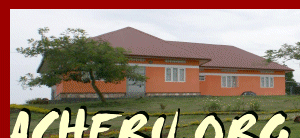|
|
| Circular -
June 2013 |
| The following
report was written by Etta Halliday when she visited Acheru last
August and went on our two monthly clinic run to Minakulu. Since
then we have placed a permanent team there, and results from the
first full month show such potential that we are already
considering running rural clinics in remote areas, and may have
to think about building an inpatient unit. I hope Etta’s
words convey something of why we need to be there. |
Brian Dorman
|
| Phone,
camcorder, camera and chargers? Tick. Books to relieve
travelling boredom? Tick. Notebooks and pens, laptop and
charger, torch, spare batteries? Tick. Padlock for case? Enough
clothes to last at least four or five days without washing…
and so my packing checklist goes on… telling the story of
what I consider “essentials” for the trip. |
| A week
later, and I’m on a bumpy, dusty road in northern Uganda.
In the seat behind, trying to keep her balance as we lurch in
and out of potholes is a mum, one arm wrapped round her toddler.
Her luggage is wedged under the seat. It’s a large,
multi-purpose washing up basin, its contents held in place by a
knotted, well-worn sheet. As well as handling the washing up,
the basin will be used as a sink for bathing and laundry too.
She’s brought a spare dress for her little girl to wear
while her only other dress is being washed; two garments and
spare pants make up a full wardrobe that will last for weeks,
maybe months. The worn remains of a bar of soap is tucked in
beside a comb, a cooking pot, and small bags of beans and flour. |
| Packing is
simple when you don’t have much to start with. I have so
much, she has so little. I’m slightly embarrassed, hoping
she’ll think the small rucksack I carry for this three-day
clinic run is all I have. |
| We’re
travelling together to Acheru in the company of 12 sweaty bodies
and luggage squeezed into a 15 seater minibus for just over nine
hours. It’s 30-something degrees outside. Inside, the open
windows bring some coolness as we drive- as well as lots of red
dust that coats faces, luggage, a crate of medical equipment , a
generator and two fairly unhappy chickens. The birds were gifted
by a very grateful mum when we stopped to check on her child’s
progress since being discharged from Acheru several months
earlier. |
| So why make
such a long, uncomfortable journey? Why would these mums pack up
their worldly goods and leave home for maybe weeks or months?
The reason is clear when we arrive at our destination. As
everyone clambers stiffly from the vehicle, there’s a child
with a scarred, contorted fist from an untreated burn, another
with a misshapen and ulcerated leg after a badly treated
fracture; one with feet folded inwards and toughened and
roughened skin on knees and ankles after several years of
hobbling and crawling… and two new born babies with cleft
lips and palates. Part of this month’s intake from the
mobile assessment clinics near Gulu in the north. The others
were better able to travel on the public bus with a nurse and
their journey will take an extra three or four hours. |
| They’re
all coming to Acheru because it's one of the very few places
where they’ll find help. I’m being generous here –
I haven’t yet heard of anywhere else in Uganda that offers
such an amazing service. This purpose built unit may have just
officially opened in October 2011, but Acheru’s dedicated
Christian team has helped literally thousands of children since
the work began on a previous site over a decade ago. |
| The
commitment and love shown to these children is clear. |
| From here,
the staff will bring the children to hospital for x-rays,
assessments and surgery. At Acheru there’ll be daily
dressings, nursing care and physiotherapy as necessary. Parents
and children will have all accommodation and food provided for
as long as this is “home”. Once well healed, well fed
and strong again, the children will be brought back to their
village and the staff will make regular visits to check their
progress for a long time afterwards. |
| Visiting
for the second time in a year, I’m struck yet again by how
joyful a place Acheru is. Despite the assortment of crutches,
wheelchairs, metal frames, plaster-casts, pinned bones and
endless bandages, the children enjoy themselves here and there’s
plenty of laughter. It’s a far cry from what they’re
used to. In the village, their disabilities often make them
curiosities or even embarrassments to their families. If the
witch doctors are to be believed some of these little ones are
the bearers of curses. |
| About half
of the children will be from a Muslim background, yet the warmth
of the welcome and the kindness of the staff means most parents
are happy to join in with the fun of a visiting Sunday school
class or with evening epilogues led by members of the local
church. The message is clear: this is Christian love in action;
every child is a gift from God, so they’re important and
deserve our love and care and that belief is underlined in the
unit’s name - Acheru – the Afaayo Child Health,
Education and Rehabilitation Unit. In the local language, Afaayo
means “God Cares” – something that is so very
evident at Acheru. |
|
|
|



